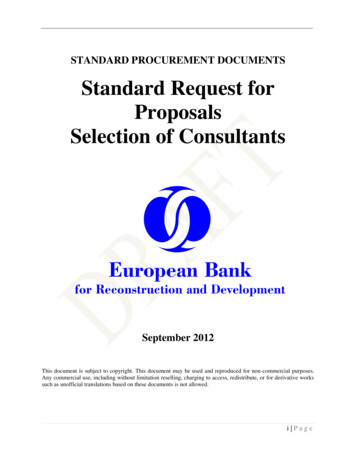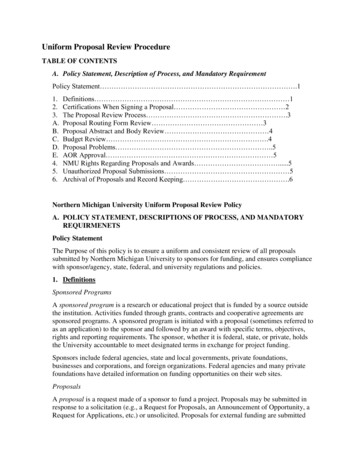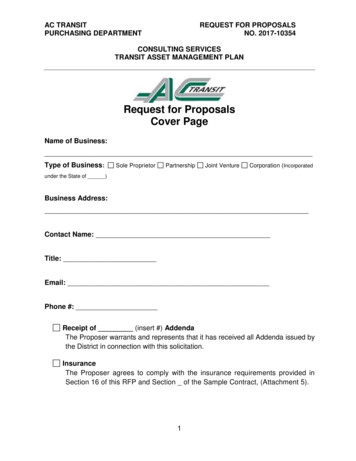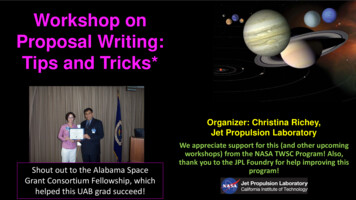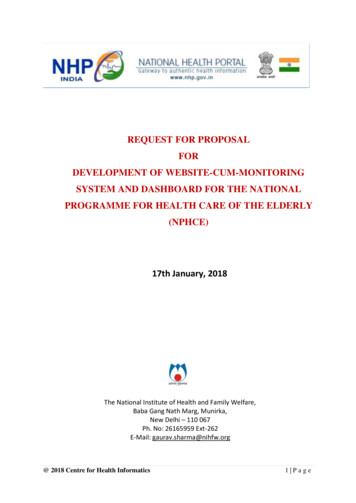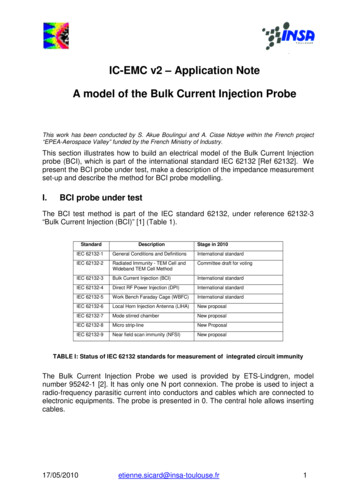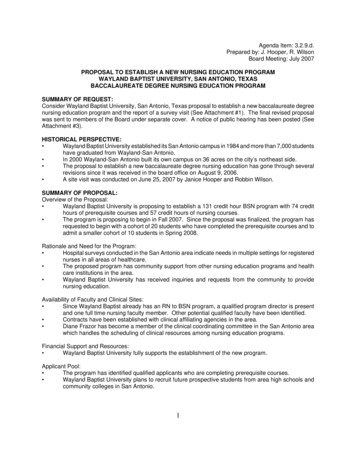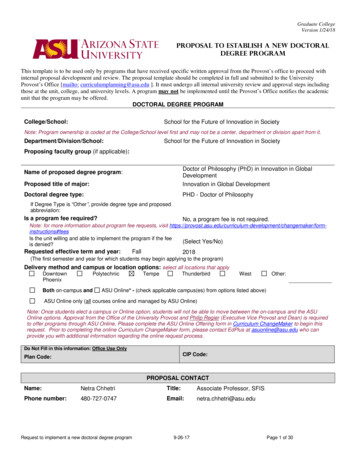
Transcription
Graduate CollegeVersion 1/24/18PROPOSAL TO ESTABLISH A NEW DOCTORALDEGREE PROGRAMThis template is to be used only by programs that have received specific written approval from the Provost’s office to proceed withinternal proposal development and review. The proposal template should be completed in full and submitted to the UniversityProvost’s Office [mailto: curriculumplanning@asu.edu ]. It must undergo all internal university review and approval steps includingthose at the unit, college, and university levels. A program may not be implemented until the Provost’s Office notifies the academicunit that the program may be offered.DOCTORAL DEGREE PROGRAMCollege/School:School for the Future of Innovation in SocietyNote: Program ownership is coded at the College/School level first and may not be a center, department or division apart from it.Department/Division/School:School for the Future of Innovation in SocietyProposing faculty group (if applicable):Proposed title of major:Doctor of Philosophy (PhD) in Innovation in GlobalDevelopmentInnovation in Global DevelopmentDoctoral degree type:PHD - Doctor of PhilosophyName of proposed degree program:If Degree Type is “Other”, provide degree type and proposedabbreviation:Is a program fee required?No, a program fee is not required.Note: for more information about program fee requests, visit ngemaker/forminstructions#feesIs the unit willing and able to implement the program if the fee(Select Yes/No)is denied?Requested effective term and year:Fall2018(The first semester and year for which students may begin applying to the program)Delivery method and campus or location options: select all locations that applyDowntownPhoenixPolytechnicBoth on-campus andTempeThunderbirdWestOther:ASU Online* - (check applicable campus(es) from options listed above)ASU Online only (all courses online and managed by ASU Online)Note: Once students elect a campus or Online option, students will not be able to move between the on-campus and the ASUOnline options. Approval from the Office of the University Provost and Philip Regier (Executive Vice Provost and Dean) is requiredto offer programs through ASU Online. Please complete the ASU Online Offering form in Curriculum ChangeMaker to begin thisrequest. Prior to completing the online Curriculum ChangeMaker form, please contact EdPlus at asuonline@asu.edu who canprovide you with additional information regarding the online request process.Do Not Fill in this information: Office Use OnlyCIP Code:Plan Code:PROPOSAL CONTACTName:Netra ChhetriTitle:Associate Professor, SFISPhone est to implement a new doctoral degree program9-26-17Page 1 of 30
Graduate CollegeVersion 1/24/18PROPOSAL TO ESTABLISH A NEW DOCTORALDEGREE PROGRAMPlease note: Proposals for new degrees also require the review and recommendation of approval from the UniversityGraduate Council, Curriculum and Academic Programs Committee (CAPC), the Academic Senate (2 readings), and theOffice of the Provost before they can be put into operation.The final approval notification will come from the Office of the Provost.1. PURPOSE AND NATURE OF PROGRAMA. Provide a brief program description:Fueled by advances in science and technology, the 20th century brought significant economic growthworldwide. However, singularly focused development approaches prioritizing economic growth are nowchallenged by pressing concerns of inequalities, global environmental change, conflict and violence, demandsfor equal access to resources, and migration to cities. This is further compounded by global aspirations forsustainable futures for all. Addressing these concerns with foresight has become the moral and politicalimperative of the moment. The global knowledge economy is also changing, as technological innovationsaround communication networks are impacting development outcomes. Yet, technology transfers, which areoften viewed as the engines of development, are challenged by emerging alliances and vibrant grassroots andcitizen movements on local levels. In light of this, the School for the Future of Innovation in Society (SFIS)proposes to establish a doctoral degree in Innovation in Global Development that creates new values about themeaning of development and has a real impact on societies. This degree will expand the intellectualfoundations needed to address the complex global development challenges of the 21st century. By providingcoursework and real-world exposure to both the successes and failures of past models of development, theproposed PhD seeks to provide opportunities for students to reimagine development policies and practicescrucially needed for the world. This will include challenging the orthodoxies around technology anddevelopment. While maintaining significant academic rigor while offering an array of course choices, the visionof this program is to produce critical and independent thinkers who provide leadership for innovative solutions todevelopment issues that meet the needs of the present while enhancing the ability of future generations to meettheir own needs.B. Will concentrations be established under this degree program?YesNo(Please provide additional concentration information in the curricular structure section – number 7.)2. PROGRAM NEEDExplain why the university should offer this program (include data and discussion of the target audience andmarket).No other doctoral program in the United States of which we are aware addresses complex development challengesin a truly inclusive manner. No other doctoral program in Arizona focuses on innovations in global development as apathway toward this more inclusive future. The newly proposed PhD in Innovation in Global Development at theSchool for the Future of Innovation in Society (SFIS) at Arizona State University (ASU) embraces this fact. Byincluding innovation in the delivery of content, the degree sets a new standard for a research-based doctoralprogram at SFIS. Through cutting-edge research and evidence-based learning, the degree seeks to take anRequest to implement a new doctoral degree program9-26-17Page 2 of 30
Graduate CollegeVersion 1/24/18PROPOSAL TO ESTABLISH A NEW DOCTORALDEGREE PROGRAMexpansive view of development policies and practices, allowing the student to gain both depth and breadth throughthe exploration ofissues that shed light on the failures and successes of both traditional and emerging models of development. Thisprogram emphasizes the study and practice of social responses to development challenges, cultural diversity anddemocratic accountability. More specifically, existing development crises emerge as a product of institutional failure,often caused or exacerbated by technologies imposed on a fragile social and cultural setting of people at themargin. In this regard, current development policies and practices are not sufficient to successfully address theseissues. Indeed, they tend to contribute to further marginalization. With the advent of the United Nations SustainableDevelopment Goals (SDGs), there is a new framework in place to pursue a universal approach todevelopment. This doctoral degree seeks to connect governments, donors, civil society, and developmentscholarship to explore innovative ways to address the stubborn challenges of global development.Students selected for the program will often be professionals currently working in development organizations, suchas the USAID, the World Bank, regional development banks, the United Nations Development Program,international non-governmental development organizations (e.g., Oxfam, CARE, Save the Children, etc.), nationalNGOS, national governments, and university faculty engaged in development activities seeking advanced degrees.These students are expected to spend no more than 18 months in residence, and then pursue their dissertationresearch through close collaboration with a designated faculty chair and members of their dissertation committeeusing innovative digital platforms. Their doctoral dissertations will be prepared either on campus or at a distance,relevant to their need and their research foci, with presentation and final defense on the ASU campus. In addition touncovering challenges and barriers to development, their dissertations will also offer context specific solutions withbroader applications for improving the well-being of societies. Students, once graduated, will confront the orthodoxyaround conventional development approaches, and strive to make and implement new policies and practices thatinclude greater recognition of a diversity of local issues and problems. The knowledge and skillsets that this newgeneration of development experts possesses will make them leaders in dealing with global development challengeswith foresight and imagination that will be primarily focused on human well-being and quality of life for all.Students will find this transdisciplinary degree to be unique, relevant, and compelling to advance both theirprofessional and personal goals. For example , a 2015 survey of experienced development professionals byDEVEX -the largest provider of recruiting and business development services for global development - in partnershipwith US Agency for International Development (USAID) revealed that 79% of respondents believe that they will dobetter job as development practitioners if they have graduate degree in global development. In the same survey 90%also believed that it is important for development practitioners to have a basic understanding of working with widerange of stakeholders than a group of people with specific specializations – revealing the need for interdisciplinarydegree. Among the respondents 75% felt that future development professionals will need to have a greaterunderstanding of social and cultural dimensions of development versus technical skills alone. The PhD in Innovationin Global Development not only increases the employability of candidates in the academic market, it also expandstheir employment prospects in public and private sector organizations engaged in development activities.Increasingly, universities around the world are adding development programs in response to global needs. Inaddition, development agencies are also seeking broadly trained professionals who bring transdisciplinaryperspectives to solve increasingly complex global challenges.The unmatched expertise housed within SFIS and its partner schools at ASU and other organizations throughout theworld put us in a unique position to fulfill this emerging need through this degree.3. IMPACT ON OTHER PROGRAMSAttach any letters of collaboration or support from impacted programs (see checklist). Please submit as a separatedocument.Letters of Support are included from these units:W.P. Carey School of BusinessSchool of SustainabilityRequest to implement a new doctoral degree program9-26-17Page 3 of 30
Graduate CollegeVersion 1/24/18PROPOSAL TO ESTABLISH A NEW DOCTORALDEGREE PROGRAMSchool of Human Evolution and Social ChangeSchool of Politics and Global StudiesThunderbird School of Global ManagementCollege of Public Service and Community Solutions4. PROJECTED ENROLLMENTHow many new students do you anticipate enrolling in this program each year for the next five years?Note: The Arizona Board of Regents (ABOR) requires that six doctoral degrees be awarded every three years. Thus, theprojected enrollment numbers must account for this ABOR requirement.5-YEAR PROJECTED ANNUAL ENROLLMENTPlease utilize thefollowing tabularformatNumber of StudentsMajoring(Headcount)1st Year102nd Year3rd Year4th Year5th Year(Yr. 1 continuing new entering)(Yr. 1 & 2 continuing new entering)(Yrs. 1, 2, 3 continuing new entering)(Yrs. 1, 2, 3, 4 continuing new entering)152025305. ACCREDITATION OR LICENSING REQUIREMENTS (if applicable)Provide the names of the external agencies for accreditation, professional licensing, etc. that guide your curriculumfor this program, if any. Describe any requirements for accreditation or licensing.N/A6. STUDENT LEARNING OUTCOMES AND ASSESMENTAttach a PDF copy of the assessment plan printed from the University Office of Evaluation and EducationalEffectiveness assessment portal demonstrating UOEEE’s approval of your assessment plan for this program. Visitthe assessment portal at https://uoeee.asu.edu/assessment-portal or contact uoeee@asu.edu with any questions.See Appendix II for Assessment Plan attachment.7. Curricular StructureA. Curriculum ListingRequired Core Courses for the DegreePrefix and NumberCourse TitleNew Course?IGD 601Re-Thinking Global DevelopmentIGD 602Innovation for Inclusive DevelopmentIGD 603Methods for Research in Global DevelopmentIGD 604Colloquium in Innovation in Global DevelopmentGTD 505Research Design in Technology and DevelopmentYesYesYesYesNo(Select Yes/No)*Students are required to take IGD 604 once for 2 creditsas a core course requirement. They may take it oneadditional time for 2 more credits that can be used towardsthe Electives.Section sub-total:Request to implement a new doctoral degree program9-26-17Page 4 of 30Credit Hours4442*317
Graduate CollegeVersion 1/24/18PROPOSAL TO ESTABLISH A NEW DOCTORALDEGREE PROGRAMElective or Research Courses(as deemed necessary by supervisory committee)Prefix and NumberCourse TitleNew Course?Elective courses can be chosen from applicable courses inthe following areas based on the students' area of interestand approval from their committee (see full list of sampleelectives in Appendix III):NoCredit Hours25School for the Future of Innovation in SocietyCollege of Public Service and Community SolutionsW.P. Carey School of BusinessSchool of Human Evolution and Social ChangeSchool of SustainabilitySchool of Politics and Global StudiesThunderbird School of Global ManagementOther Electives may be used with approval from theacademic unit.(Select Yes/No)Section sub-total:Culminating ExperienceE.g. – Capstone course, applied project, dissertation with oral defense (12 credit hours)IGD 799 DissertationSection sub-total:For doctoral programs – When approved by the student’s supervisory committee, will this program allow up to 30credit hours from a previously awarded master’s degree to be used for this program? If applicable, please indicatethe 30 credit hour allowance that will be used for this degree program.25Credit Hours121230If students are admitted with only a bachelor’s degree, will the remaining coursework be made up ofYesNoresearch and elective coursework?If no, please list here what coursework these students must take to complete the 30 credit hours:Total required credit hours1.2.3.84List all required core courses and total credit hours for the core (required courses other than internships, dissertation, capstone course,etc.).Omnibus numbered courses cannot be used as core courses.Permanent numbers must be requested by submitting a course proposal to Curriculum ChangeMaker for approval.B. Will concentrations be established under this degree program?YesNo8. COURSESA. Course Prefix(es): Provide the following information for the proposed graduate program.i.Will a new course prefix(es) be required for this degree program?YesNoIf yes, complete the Course Prefixes / Subjects Form for each new prefix and submit it as part of thisproposal submission. Form is located under the courses tab.Approval for the new IGD prefix was granted on November 17, 2017.Request to implement a new doctoral degree program9-26-17Page 5 of 30
Graduate CollegeVersion 1/24/18PROPOSAL TO ESTABLISH A NEW DOCTORALDEGREE PROGRAMB. New Courses Required for Proposed Degree Program: Provide course prefix, number, title, credit hours anddescription for any new courses required for this degree program.IGD 601 – Rethinking Global Development, 4 creditsThis core course traces and analyzes the origins of international or global development as theory, concept,policy, and practice. Students will study the key theories that have been influential in developmentconceptualization and policy, within the context of the history in which they arose, evaluate the results, andconsider future trends and scenarios considering the critiques of such mainstream approaches.IGD 602 – Innovation for Inclusive Development, 4 creditsClear advances in economic, social and political development and wealth generation have been uneven, andhave resulted, as well, in an increasing gap between wealth and poverty. Continuing in the same direction couldexacerbate existing problems, and in this course, we will imagine different future outcomes and how to makepolicy today for a better future.IGD 603 – Methods for research in Global Development, 4 creditsThis course provides students with a practical introduction to research methods and methodologies in globaldevelopment. Through hands-on exercises, students will be exposed to issues around quantitative andqualitative data collection and management, analysis and interpretation of results, and research ethics andpractice in development as well as application of research to policy development and its implications.IGD 604 - Colloquium in Innovation in Global Development, 2 credits - Students are required to take IGD 604 oncefor 2 credits as a core course requirement. They may take it one additional time for 2 more credits that can be used towardsthe Electives.This student-centered and faculty-mentored colloquium provides critical opportunities for leadership,organization, planning and implementation of events related to global development studies. It encouragesstudents to propose and plan their own events, focused on issues and topics of importance to them, and utilizingthe resources on the ASU campus and Phoenix area.9. FACULTY, STAFF, AND RESOURCE REQUIREMENTSA. Facultyi.Current Faculty - Complete the table below for all current faculty members who will teach in the program. Iflisting faculty from an academic unit outside of the one proposing the degree, please provide a supportstatement from that unit.NameRankSasha BarabProfessorMichael rDiana BowmanDarlene CavalierProfessor ofPracticeRequest to implement a new doctoral degree programHighestDegreePh.D.J.D.J.D.M.L.A.9-26-17Area ofSpecialization/ExpertiseEcosystem Ecology; EducationTechnologyFuture Thinking; DiversityEstimated Levelof InvolvementChair, TeachHealth Law and Policy;Nanotechnology;Public/Community Health;Governance: Globally OrientedInstitutionsEquity, Justice andSustainability; ScienceCommunication andBroadcastingChair, TeachChair, TeachChair, TeachPage 6 of 30
Graduate CollegeVersion 1/24/18PROPOSAL TO ESTABLISH A NEW DOCTORALDEGREE PROGRAMBenedicte CallanClinicalProfessorPh.D.Robert CookDeeganProfessorM.D.Britt inicalAssociateProfessorPh.D.Netra ChhetriAssociateProfessorPh.D.Nalini ChhetriClinicalAssociateProfessorPh.D.Erik FisherAssociateProfessorPh.D.Emma FrowAssistantProfessorPh.D.Gary GrossmanAssociateProfessorPh.D.David GustonFoundationProfessorPh.D.Lee GutkindProfessorB.A.Laura HosmanAssistantProfessorPh.D.Request to implement a new doctoral degree program9-26-17Political and economic impactof new technologies in lifesciences and medicineBiomedicine; Science Policy;Patent Law; Molecular Basis ofHealthEnvironment; Water;Geography; SustainableDevelopmentEnergy Policy; HumanDimensions of Science andTechnology; History of Science;Science Policy; Public Policy;Energy and SustainabilityClimate Change; Food Policy;Science Policy; HumanDimensions of SustainabilityChair, TeachClimate impacts andcommunication; Technologicalimpacts in developing nations;knowledge systems, urbansustainabilityPolitics and Policy of Scienceand Technology; Governanceof Emerging TechnologiesEngineering Ethics; HumanDimensions of Science andTechnology; Science andSociety; Bioengineering;Science PolicyGlobalization; SustainableDevelopment; InformationTechnology; Transportation;EducationDevelopment Policy;Technology Assessment; PublicParticipation in Science andTechnology; Politics of SciencePolicyCommunication; CreativeNonfictionEmerging Technologies;Human Dimensions of Scienceand Technology; HumanValues; Renewable Energy;Educational Technology;Economic Development;Energy and Sustainability;Sustainable Development;Inequality; Cultural Studies andTechnology; EntrepreneurshipChair, TeachChair, TeachChair, TeachChair, TeachProgram Director,Chair, TeachChair, TeachChair, TeachChair, TeachChair, TeachCo-Chair, TeachChair, TeachPage 7 of 30
Graduate CollegeVersion 1/24/18PROPOSAL TO ESTABLISH A NEW DOCTORALDEGREE PROGRAMLekelia “Kiki”JenkinsAssociateProfessorPh.D.Erik JohnstonAssociateProfessorPh.D.Darshan KarwatAssistantProfessorPh.D.Lauren h.D.Andrew MaynardProfessorPh.D.Clark MillerProfessorPh.D.Thaddeus MillerAssistantProfessorPh.D.Mary rofessorClinicalAssistantProfessorPh.D.Kris MaysJennifer RichterHeather RossDaniel SarewitzProfessorRequest to implement a new doctoral degree programJ.D.Ph.D.Ph.D. DNPPh.D.9-26-17Conservation Policy; FisheriesManagement; HumanDimensions of Science andTechnology; MarineConservation; EnvironmentalSocial Science; TechnologyAdoptionUsing Models and Simulationsto help make Policy Choices;Dynamics of Policy Decisions;Complex Systems Methodologyand TheoryBiofuels; Climate Change;Communities; Energy Policy;Engineering Ethics; HumanDimensions of Science andTechnology; SustainabilityEthics; Energy andSustainabilityHuman Dimensions of Scienceand Technology; Science andSocietyRegulatory Models andPerformance Regulation;Energy Policy and RegulationPublic/Community Health;Materials and Nanoscience;Communication; PhysicalSciences Communication;Science Communication andBroadcasting; VisualCommunication;Entrepreneurship; Food Safetyand ResponseEnergy Policy; Science andSociety; Science PolicySustainability; Science andTechnology Policy;Infrastructure DesignLearner-based Teaching;Sustainability; TransdisciplinaryChair, TeachScience and Society; EnergyJustice; Energy TransitionsHealth Law and Policy; HumanDimensions of Science andTechnology; History of Science;Biomedicine; Science Policy;Health Information TechnologyConnections between SciencePolicy and Decision Making;Scientific Research and SocialOutcomesChair, TeachChair, TeachChair, TeachChair, TeachCo-Chair, TeachChair, TeachChair, TeachChair, TeachChair, TeachChair, TeachChair, TeachPage 8 of 30
Graduate CollegeVersion 1/24/18PROPOSAL TO ESTABLISH A NEW DOCTORALDEGREE hnology and Society; Ethicsand Technology; ScientificEngagement and Society;Human Dimensions of Scienceand Technology; ScienceCommunication; SciencePolicy;Chair, TeachNew Faculty - Describe the new faculty hiring needed during the next three years to sustain the program.List the anticipated hiring schedule and financial sources for supporting the addition of these facultymembers.Current faculty in the School for the Future of Innovation in Society (SFIS) will support this program inteaching the curriculum, chairing and co-charing supervisory committees, and/or otherwise being fullyengaged with students. New faculty to be hired under the existing hiring plan for SFIS may also becomeadditional faculty.iii.Administration of the program - Explain how the program will be administered for the purposes ofadmissions, advising, course offerings, etc. Discuss the available staff support.Program Chair for the PhD in Innovation in Global Development (IGD) and the IGD committee will overseethe program. Admissions, general advising, and class scheduling will fall to the current staff infrastucturethat exists within the School for the Future of Innovation in Society (SFIS). Academic advising will primarilybe the responsibility of each student's faculty mentor/advisor.B. Resource requirements needed to launch and sustain the program: Describe any new resources requiredfor this program’s success such as new staff, new facilities, new library resources, new technology resources,etc.No additional resources required.Request to implement a new doctoral degree program9-26-17Page 9 of 30
Graduate CollegeVersion 1/24/18PROPOSAL TO ESTABLISH A NEW DOCTORALDEGREE PROGRAMAPPENDIXOPERATIONAL INFORMATION FOR GRADUATE PROGRAMS(This information is used to populate the Graduate Programs Search/catalog website.)1. Proposed title of major: Doctor of Philosophy (PhD) in Innovation in Global Development2. Marketing description (Optional - 50 words maximum. The marketing description should not repeat content found in theprogram description.)The PhD in Innovation in Global Development provides development professionals and those aspiring to be theexpertise to make an impact on issues facing humanity all over the world. The degree takes an expansive view ofdevelopment theories, policies and practices, using traditional and emerging models to encourage transformativechange.3. Provide a brief program description (Catalog type (i.e. will appear in Degree Search) – no more than 150 words. Do notinclude any admission or curriculum information)The PhD in Innovation in Global Developmnet emphasizes critical and diverse perspectives on global developmentand innovative policies and practices that challenge the status quo. This program is both rigorous and flexible,designed to meet the needs of a diverse set of students committed to a vision of development that values context,inclusivity, equity, and is socially, culturally and ecologically sensitive. Students will emerge from this programequipped with leadership skills, critical thinking, knowledge, and global perspective required to navigate complexdevelopment challenges in a way that reduces inequalities and builds a more sustainable and inclusive future.4. Delivery/Campus Information Options:On-campus only (ground courses and iCourses)5. Campus(es) where program will be offered:ASU Online curriculum consists of courses that have no face-to-face content. iCourses are online courses for students in oncampus programs. iCourses may be included in a program, but may not comprise the entirety of a program. On-campusprograms must have some face-to-face content.Note: Office of the Provost approval is needed for ASU Online delivery option.ASU Online only (all courses online and managed by ASU Online)All other campus or location options (please select all that apply):DowntownPhoenixBoth on-campus andPolytechnicTempeWestOther:ASU Online* - (check applicable campus(es) from options listed above)*Note: Once students elect a campus or Online option, students will not be able to move between the on-campus and the ASUOnline options. Approval from the Office of the University Provost and Philip Regier (Executive Vice Provost and Dean) isrequired to offer programs through ASU Online. Please complete the ASU Online Offering form in Curriculum ChangeMaker tobegin this request. Prior to completing the online Curriculum ChangeMaker form, please contact EdPlus at asuonline@asu.eduwho can provide you with additional information regarding the online request process.6. Admission Requirements:Applicants must fulfill the requirements of both the Graduate College and theSchool for the Future of Innovation in Society .Applicants are eligible to apply to the program if they have earned a bachelor's or master's degree in Anthropology,Natural Resource Management, Agriculture Development, Political Science, Development Studies, Economics,Development Management, Rural Development, Technology and Development, Sociology, Science andTechnology, or related field, from a regionally accredited institution.Applicants must have a minimum of a 3.00 cumulative GPA (scale is 4.00 "A") in the last 60 hours of a student'sfirst bachelor's degree program, or applicants must have a minimum of a 3.00 cumulative GPA (scale is 4.00 "A")in an applicable master's degree program. (modify or expand if applicable)Request to implement a new doctoral degree program9-26-17Page 10 of 30
Graduate CollegeVersion 1/24/18PROPOSAL TO ESTABLISH A NEW DOCTORALDEGREE PROGRAM(other minimum requirement(s))Applicants are required to submit:1. graduate admission application and application fee2. official transcripts3. proof of English proficiency4. GRE scores5. letter of intent/written statement6. professional resume7. three letters of recommendation8. (Select one)9. (any other application components)Additional Application InformationAn applicant whose native language is not English (regardless of current residency) must provide proof of Englishproficiency.7. Application Review Terms (if applicable session):Indicate the first term and year in which applications will be opened for admission. Applications will be accepted ona rolling basis after that time.Note: It is the academic unit’s responsibility to display program deadline dates on their website.TermsYearsUniversity Late Fee DeadlineFall (regular)Session B(year): 2018July 1st(year):October 1stSpring (regular)Session B(year): 2018December 1st(year):February 8thSummer (regular)Summer B(year):May 14th(year):May 14thNote: Session B is only available for approved online programs.Program admission deadlines website address: They will be included on the degree search page for the programonce it is created as well as our School website.8. Curricular Requirements:Curricular Structure Breakdown for the Academic Catalog:(To be completed by the Graduate College)Required Core (17 credit hours)Electives or Research (25 credit hours)Culminating Experience (12 credit hours)9. Comprehensive Exams:Doctoral Comprehensive Exam (required), please select from the appropriate box.A written comprehensive exam is required for all doctoral programs.An oral comprehensive exam is also required.Request to implement a new doctoral degree program9-26-17Page 11 of 30
Graduate CollegeVersion 1/24/18PROPOSAL TO ESTABLI
PROPOSAL TO ESTABLISH A NEW DOCTORAL DEGREE PROGRAM Request to implement a new doctoral degree program 9-26-17 Page 1 of 30 . This template is to be used only by programs that have received specific written approval from the Provost's office to proceed with internal proposal development and review.
